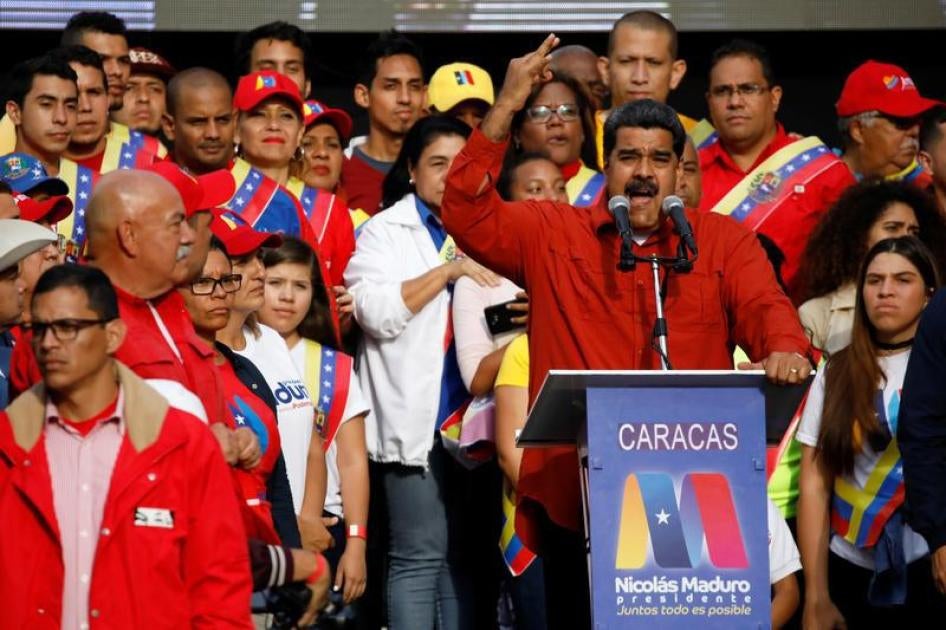(Caracas, Venezuela) – Many Venezuelans will go to the polls on Sunday hungry. And some may be voting in the presidential election only because they fear what will happen to them if they stay home.
Getting food and medicine has become a daily preoccupation here. Most Venezuelans go to bed hungry or are eating less due to food shortages, and moderate to severe malnutrition of children under 5 increased in 2017. Venezuela’s health minister released data last year indicating that, in 2016, maternal mortality increased 65 percent, infant mortality 30 percent, and malaria cases 76 percent. Days later, President Nicolás Maduro fired her.
Mr. Maduro’s government denies that the humanitarian crisis exists. The truth is that failed government policy has ruined the economy, resulting in hyperinflation and severe shortages, and millions of Venezuelans cannot afford to buy food on the open market. Government-controlled rations are their only option.
Yet instead of allowing government-issued boxes of food to be sold by supermarkets, the Maduro regime has been using the military and its supporters to distribute them. Through this system — in which food distribution is controlled by government allies, people who tend to punish government critics — the Venezuelan authorities are using hunger as a mechanism of social and political control.
In January 2017, the Maduro regime started a campaign asking Venezuelans to register for a “carnet of the Fatherland” — a special government-issued ID document that allows access to social services. Within a year, more than 16 million Venezuelans — about half of the population — had them.
Venezuelans need this ID to get the food boxes, and also some medical procedures, housing, school supplies, pensions and special Christmas and other bonuses, among other benefits. The Maduro administration found a way to use the cards to bolster government support in elections.
The country held an election last July to effectively replace the opposition-controlled National Assembly legislators with a pro-government Constituent Assembly. Mr. Maduro told voters to scan their special IDs after voting, adding “we will know who fulfilled their obligations to the Fatherland.” Venezuelan law does not require citizens to vote.
During subsequent elections for governors and mayors in 2017, high-level officials called on Venezuelans to bring these special cards to stands set up close to the polls to record that they had voted. Then, last month, Mr. Maduro said he would “give a prize” to the ID holders who vote in the presidential election. During this campaign, participants who have attended government rallies got bags of food.
This is not just about recording whether someone voted. Many Venezuelans remember when under former President Hugo Chávez, government employees who supported a referendum on his presidency were fired from their jobs or the state-owned oil company, or when the same thing happened to supporters of a referendum against Mr. Maduro two years ago.
In a country where people desperately need the food boxes, many see the government’s demand to use the special ID near the voting site as a threat: Vote for Mr. Maduro or your family won’t eat. Defying the authorities in the polling booth is too big of a risk.
For some time, people could purchase a strictly limited amount of the food packages on specific days of the week, depending on the last numbers of their identity card. They had to line up for hours outside the supermarkets, and stocks often ran out before everyone in line had been served. Shortages contributed to the politicization of distribution.
For example, one night last year, in the middle of an antigovernment protest in Caracas, one of us spotted a woman on the street talking to a member of an armed pro-government gang.
Protesters recognized the woman as the neighborhood distributor of the government’s food boxes. She, in turn, noticed her neighbors looking at her and screamed that people who had participated in antigovernment demonstrations would no longer get the boxes of food. And most haven’t.
Our organizations have repeatedly received credible allegations of similar discriminatory behavior elsewhere.
More than a dozen regional governments and the European Union have called on the Venezuelan government to postpone the election for not meeting international standards for free-and-fair elections. In the coming days, foreign governments should press the Maduro government to abandon any effort to use the carnet to record if they voted.
And representatives from the Americas and Europe should urgently convene a high-level meeting with key international aid groups to look for ways to open a humanitarian channel so there are no more hostages of hunger in Venezuela.
Food should not be used to intimidate hungry people.









